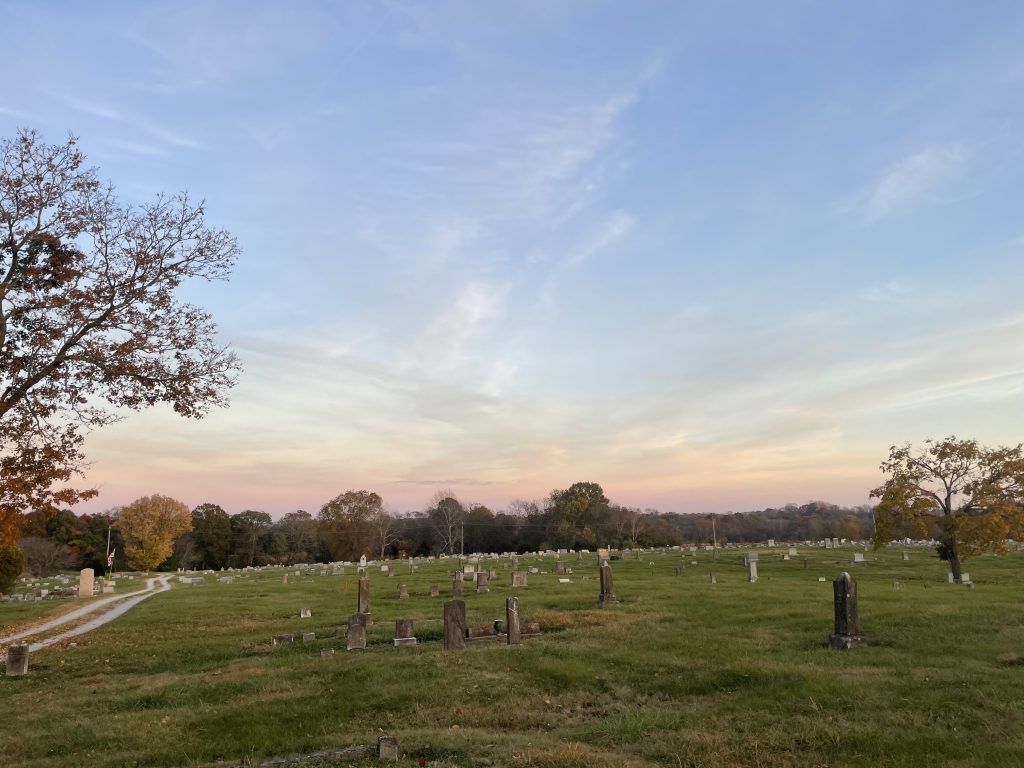
Legacy is not leaving something for people. It’s leaving something in people.
Peter Strople
Early winter bustled into our country town. The Weatherman would have had a few things to say about that, but we can’t ask him today; so we consider his memory.
Rumbling up over the churning cemetery road, a string of eclectic vehicles processed around the once grand though now crumbling family burial plots. Yesteryear tributes of imposing angels and soldiers angled about as the cavalcade made its way to the backside of the hill.
Stretched out before us was a stark panorama of simple markers and in countless cases barely noted grave sites. The burial grounds of predominantly African Americans in our community was first laid out when life was rigidly divided, and God help us, shamefully tilted in favor of those who now need forgiveness.
All the little children of his world came to bless the interment of the extra-sized baby blue casket. A spry of red, yellow, blue and white flowers marked the end of his 59 year journey; his mighty girth now at rest from a weary footslog.
Melvin or the Weatherman known for his insatiable consideration of meteorology was destined to be in the minds of all who knew him or knew of him as a challenging community figure. He hoed a different road.
In broken English a friend of mine once exclaimed in enthusiasm: “We must get the roll balling!” This was Melvin.
His abiding presence was tender and disturbing. I first spotted him decades ago plodding the highways and byways of Columbia, Tennessee. His massive black body swaying side to side, his grocery cart filled to the brim with bagged stuff – destination unknown. His existence pricked my image of self importance and prompted me to deal with my ego.
Melvin was open to conversation but only if others acknowledged him first. “Hey, Gurllll,” he would say in a shockingly high-pitched voice. We exchanged pleasantries as he had extra advice about cloud cover and particular passages in the Bible. I never saw him beg though he was in great need at times.
One such time our Reverend Joe Evans looked out across the street from the First Presbyterian (USA) point of view and saw Melvin ensconced on the steps of the First Baptist Church which was empty and for sad sale. He invited him over for shelter and fellowship. Melvin took to Joe’s open heart.
Eventually Melvin made a permanent home on the garage edge of the church’s parking lot. He would settle himself each morning outside on the porchlet like a Black buddha and recite songs and scripture all day long. Rain or shine, depending on his mood some chants rang out as rants and some as blessings.
Many from the world of pomp and circumstance came unto his presence for consultation. Only God knows if it was Melvin or the posing philanthropist who was the beneficiary. Certainly Reverend Evans appreciated the implied role reversal when he asked Melvin to shower for the sake of other church members. Joe was clear that his own soul resembled the prodigal son with Melvin’s gracious acquiescence.
Ever close at hand was Renea the church secretary who provided Melvin countless morning cups of coffee, food, good company not to mention the occasional birthday party and ultimately a moving eulogy.
Dalton’s law practice was situated across the street from Melvin’s perch. After years in proximity, small talk promoted endearment betwixt their places of business. After work one day D reported, “We celebrated Melvin’s birthday today with candles and cake. He bowed his head and said, ‘Thank you for all my friends.’”
Many took exception to the simplicity of Melvin’s existence. The no home, no possessions, no thought but the need for a spirit-filled life was daunting. “We all need God,” he would shout. Could Melvin’s life of seeming misfires be from God’s mouth to our ears? An unlikely bare boned prophet.
We talk plenty these days about racial healing, and I ring my mental hands to think – how in the world to begin such a thing of unspeakable magnitude? A witness to life in all its complexity was Melvin’s daily answer. His funeral broke fresh ground at the 200 year old-plus, all white First Presbyterian Church’s sanctuary just a few yards from his steadfast commitment to the present moment.
“In the end,” author Atul Gawande said, “people don’t view their life as merely the average of all its moments – which after all, is mostly nothing plus some sleep. For human beings life is meaningful because it is a story.” Melvin’s story nurtured the ideal of resurrection and that is to say when the rock steady memory of him comes back to us, we are compelled to take a second look either in defense or in acceptance.
Clarification for the measure of a man took form when white men in suits and young black men in hoodies sat together in homage with one another on pews in the sanctuary. “You can’t take anything with you,” Melvin was known to say.